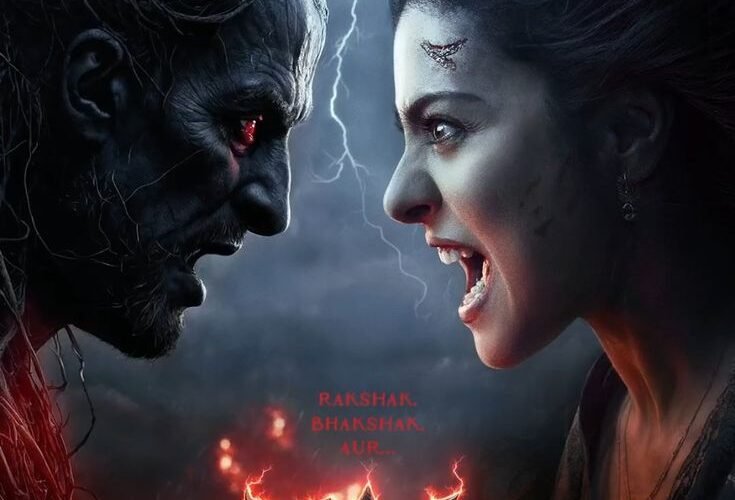Maa Review: Strong Themes, Weak Horror

The Hindi horror-drama Maa hit theaters on June 27, 2025, with much anticipation. Directed by Vishal Furia and headlined by Kajol, the film dives deep into the realms of Indian mythology, supernatural folklore, and maternal instinct. With a powerful story rooted in the battle between good and evil, Maa blends fantasy, cultural symbolism, and emotional drama. Let’s break down what worked, what faltered, and how audiences responded to this unique cinematic venture.
Plot Overview
Set in the village of Chandarpur, the story follows Ambika (played by Kajol), a widowed mother who moves to her husband’s ancestral home with her teenage daughter Shweta. From the moment they arrive, the village feels wrong—cursed, secretive, and heavy with dread. Ambika soon learns about a horrifying legend: a demonic entity known as Raktabeej targets young girls and thrives off ancient blood sacrifices. As the threat grows, Ambika must embrace her role as both a mother and a warrior, channeling the fierce spirit of goddess Kali to protect her child and confront deep-seated evils.
The story doesn’t merely revolve around ghosts and demons. It also explores patriarchal oppression, female infanticide, and the silencing of women—both historically and in modern society. Ambika fights not only a literal demon but also societal ones, making the film far more layered than a typical horror flick.
Kajol’s Commanding Performance
Kajol delivers one of her strongest performances in recent years. She commands every frame with authority, vulnerability, and raw maternal emotion. She never resorts to overacting, even when the screenplay demands dramatic shifts. Instead, she lets pain, anger, and fear simmer beneath her expressions. When she transforms from a grieving widow to a furious mother confronting demonic evil, she does so with grace and power.
Her emotional range drives the entire narrative. When the horror falters, her performance keeps the film afloat. In one scene, where Ambika begs the village elders to stop an ancient ritual, Kajol injects pure desperation into her voice. In another, she channels divine rage while defending her daughter. Both moments highlight her incredible control as an actor.
Visuals, Sound, and Mythology
Director Vishal Furia crafts a rich, unsettling atmosphere. He chooses real village locations, gloomy lighting, and shadowy corners to intensify the tension. The film leans into Indian mythological aesthetics with reverence and creativity. Temples, blood-red moon nights, and folk chants echo the spiritual horror of classics like Tumbbad or Bulbbul, though not always with the same finesse.
The cinematography emphasizes earthy tones—mud walls, oil lamps, deep forests—which reflect the themes of death, rebirth, and divine justice. The background score uses traditional instruments and chants to heighten suspense. During climax scenes, the sound design grows chaotic and thunderous, echoing Ambika’s emotional explosion.
The VFX, although not groundbreaking, delivers decent results. The portrayal of the demon Raktabeej looks fearsome and fits the mythological context. The ritual scenes, Kali incarnations, and supernatural attacks add flair without becoming cartoonish.
Themes That Hit and Miss
Maa offers bold commentary on misogyny and the suppression of women. It links the mythical story of goddess Kali to modern issues like menstrual stigma, forced silence, and gender-based violence. The film uses horror to expose these themes, making it emotionally resonant. Ambika doesn’t just battle a monster; she tears through generations of fear imposed on women.
However, the storytelling stumbles in execution. The first half moves slowly and spends too much time establishing obvious plot points. The village secrets unravel too predictably. The second half ramps up intensity, but the writing grows messy. Characters shift motivations without explanation. Exposition-heavy dialogues replace emotional realism. The horror scenes become repetitive and lose their initial impact.
Director Furia tries to juggle too many ideas. He introduces ancient folklore, feminism, psychological trauma, and supernatural vengeance—but doesn’t give any of them full resolution. A more focused script could have sharpened the emotional and thematic weight.
Critics’ Reactions
Critics widely praised Kajol’s performance. Many called her the soul of the film. Reviewers applauded the film’s attempt to combine horror with mythology and feminist themes. They admired the visuals and cultural richness but criticized the screenplay and uneven pacing.
One critic described the film as “ambitious but confused.” Another stated that “Maa belongs to Kajol alone,” acknowledging that her performance outshines the weak plot structure. Several film portals awarded the film 2.5 out of 5 stars, citing an underwhelming horror quotient and messy second act.
Despite the mixed reviews, critics recognized the effort behind the film’s message. Few Bollywood horror films attempt such layered storytelling.
Box Office Performance
Maa opened with decent numbers. On its first day, it earned between ₹2.8 crore to ₹4 crore net in India. Analysts estimated that the film might cross ₹6–8 crore by the end of its first weekend, provided the positive word-of-mouth continues.
Compared to Kajol’s previous films, Maa shows improvement. Her last theatrical release, Salaam Venky, earned under ₹2 crore on opening day. Maa surpassed that before the afternoon shows concluded. Evening and night shows showed better occupancy, especially in metropolitan cities like Mumbai, Delhi, and Hyderabad.
The film’s production budget reportedly stands at ₹55–60 crore. To achieve box office success, it must maintain momentum over the coming weeks. The makers expect strong returns from southern states, where dubbed versions in Tamil and Telugu released simultaneously.
Audience Feedback
Audiences praised Kajol and appreciated the film’s mythological horror blend. Social media reactions celebrated her fierce portrayal and the film’s powerful climax. Many viewers expressed admiration for the movie’s attempt to tackle taboo topics like menstruation and generational trauma through horror.
However, viewers also pointed out flaws. Several noted that the horror elements felt too familiar. Some complained about the sluggish pacing and predictable twists. A few mentioned that the climax felt abrupt, despite its visual richness.
Final Verdict
Maa doesn’t revolutionize horror in Indian cinema, but it dares to blend mythology, feminism, and emotion into one narrative. Kajol elevates the film with her commanding presence and fearless intensity. The film shines when it dives into symbolism and confronts real-world evils through its fantastical lens.
But the film’s writing weakens its overall power. Uneven pacing, half-baked characters, and a muddled second act drag the story down. The horror lacks originality, and the suspense never truly shocks.
Still, Maa deserves credit for trying something different. It offers a cinematic experience rooted in Indian identity, and for that reason alone, it stands apart.
Score: 2.5/5
Watch it if: You admire Kajol, enjoy mythology-inspired horror, or crave films that challenge patriarchal norms.
Skip it if: You expect jump scares, tight plotting, or fast-paced horror thrills.













